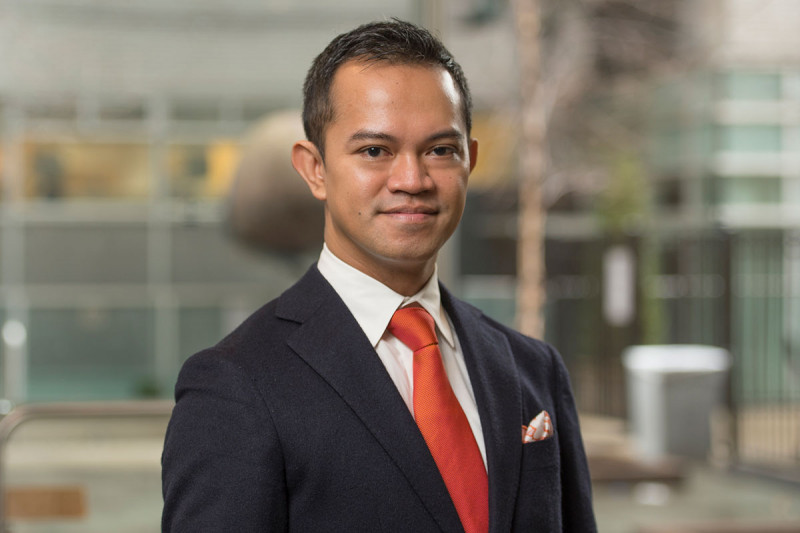
His boss’s peculiar fear gave Filemon Dela Cruz’s career a jump start.
“During college as a research assistant, I volunteered under a postdoc who was deathly afraid of mice,” says Dr. Dela Cruz, who is a pediatric sarcoma doctor at Memorial Sloan Kettering. “I ended up doing all the mouse work for her.”
Dr. Dela Cruz finished college during the tech boom of the late 1990s. Originally, he thought he’d become part of the burgeoning biotech sphere. But when his father was diagnosed with advanced kidney cancer, his mission became more personal. He started working in a pediatric cancer research laboratory at Oregon Health and Science University.
While Dr. Dela Cruz was there, a researcher named Brian Druker developed a drug that was hailed as a magic bullet for a type of leukemia. Imatinib (Gleevec®) targeted specific mutations and turned the once-fatal chronic myeloid leukemia into a manageable disease. It opened up the possibility of similar treatments for other cancers. (Editor’s note: MSK physician-scientist Charles Sawyers was also one of the key players in imatinib’s development.)
Dr. Dela Cruz was inspired. He went to medical school and did a pediatrics residency in California. Then he moved to New York City for a fellowship at Columbia University. At Columbia, he met Andrew Kung, who is now Chair of the Department of Pediatrics at MSK. Dr. Kung’s mission was to develop precision medicines for children’s cancers. In 2016, Drs. Kung and Dela Cruz moved to MSK to further expand the field’s capabilities.
At MSK, precision medicine has been in practice for years. For adults with advanced cancer, MSK experts look for cancer-causing genes with a highly sensitive tool called MSK-IMPACT™. Now, Dr. Dela Cruz and his colleagues are taking the lessons they’re learning from MSK-IMPACT and applying them to younger people.
Today, Dr. Dela Cruz splits his time between research and seeing patients. Here, he gives us a glimpse into his work.
What is precision medicine, and how is MSK applying it to the treatment of children with cancer?
Currently, the standard of care works for a majority of young patients. But there’s always 20 to 30 percent whom it doesn’t work for. At MSK, we see a lot of those patients. The vision was to create a platform where we can take a tumor, sequence it, and identify a treatment that targets specific vulnerabilities within the tumor. We’re calling it the Pediatric Translational Medicine Program [PTMP]. I’ve developed and manage the Pediatric Experimental Validation Program, which is the research component of the PTMP. Chemotherapy isn’t going anywhere, but I predict that someday, probably in our lifetimes, treatment will be very different.
What are your goals for the PTMP?
To take the discoveries we find and get them to patients as soon as possible, whether we open a trial or get a person access to a particular drug. We have the structure in place, but the hope is that we can do all of this in a more formalized way. That’s really important because we don’t always have the luxury of time.
What challenges are you trying to overcome?
We have a lot of drugs, and we’re learning how to match them to patients. Also, in sequencing there’s a mass of genetic data and mutations we’ve never seen before. How do you make sense of that? That’s where our group comes in. Every week we review the results from patients’ sequencing and discuss whether or not the mutations are significant and if there are any that we have drugs for. Then that information is transmitted to the patient’s doctor. One of our big ambitions is to do whole-genome sequencing. With MSK-IMPACT testing, we look at more than 460 genes, but humans have more than 19,000. So what about those other ones?
What happens inside the lab?
We try to answer questions, whether it’s with a computer simulation or a petri dish. One thing we also have is the PDX program, which stands for patient-derived xenografts. Essentially, we implant mice with patients’ tumors and run trials on the animal models. This is becoming a gold standard for testing drugs that could then be considered for formal evaluation in clinical trials in people.
Right now we’re setting up a drug-screening platform as well. We take patients’ tumor cells, grow them in petri dishes, then drop a different drug into each dish to see how it behaves. That’s very useful, since we can get hints on what drugs may or may not work in treating a patient’s tumor. How much of a drug do you need to give? This is not a question we can normally answer because there’s only one patient.
What discoveries are giving you hope?
A lot of clinical trials are incorporating sequencing so that we can better select people who have a higher chance of responding. That has probably affected the outcomes of many clinical trials. You may be deeming something ineffective when, in fact, you just haven’t given the right drug to the right person.
What do you love most about working at MSK?
I feel like I get paid to use my imagination with the possibility of actually helping someone. There are questions that continue to bother us, and sometimes they feel really daunting. A lot of smart, motivated, and passionate people have been trying to answer them. But what is different now? Why do we think we could do it? When I look for people to join our group in the lab, I always look for people who share this passion. A lot of things we do in the lab I know will be able to help someone in the immediate future, and not necessarily many years down the line. That drives me.




